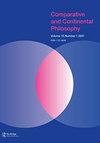Elevating the Determinations of Thought Above this Anxious, Incomplete Standpoint: On Kant’s Concept of an Intuitive Understanding and its Articulation in Hegel’s Objective Thought
IF 0.3
0 PHILOSOPHY
引用次数: 0
Abstract
ABSTRACT In this paper, we show that Kant’s complex concept of an “intuitive understanding” (or in a broader sense “superior understanding”), which operates in his work as a tool for defining the peculiar character of our (human) understanding, is critically absorbed by Hegel’s concept of “objective thought.” By means of this concept, Hegel first rejects the representational (and classificatory) conception of thought that is implied by the Kantian concept of an intuitive understanding and, second, he proposes a way of comprehending thought that allows a new conception of the relationship between the subject and reality.把思维的规定提升到这种焦虑的、不完整的立场之上——康德的直观理解概念及其在黑格尔的客观思维中的表述
在本文中,我们表明康德的“直观理解”(或更广泛意义上的“卓越理解”)的复杂概念,在他的作品中作为定义我们(人类)理解的独特特征的工具,被黑格尔的“客观思维”概念批判性地吸收了。通过这一概念,黑格尔首先拒绝了康德的直观理解概念所隐含的思维的表征(和分类)概念,其次,他提出了一种理解思维的方法,这种方法允许对主体与现实之间的关系有一个新的概念。
本文章由计算机程序翻译,如有差异,请以英文原文为准。
求助全文
约1分钟内获得全文
求助全文

 求助内容:
求助内容: 应助结果提醒方式:
应助结果提醒方式:


